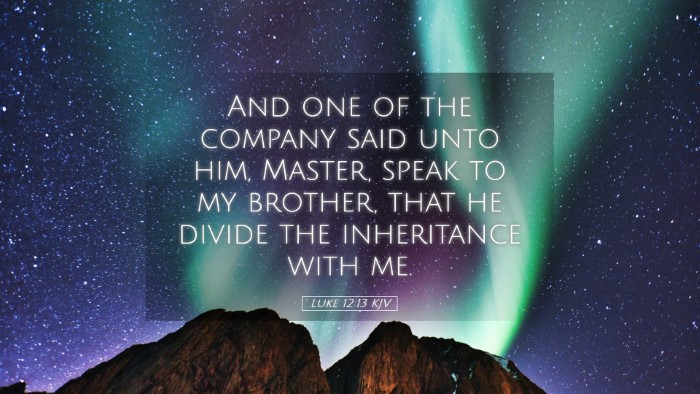Commentary on Luke 12:13
Text of the Verse: "Someone in the crowd said to Him, 'Teacher, tell my brother to divide the inheritance with me.'" (Luke 12:13, NIV)
Introduction
This verse encapsulates a moment where Jesus is approached by a man seeking justice or perhaps a fair distribution of his inheritance. It raises important questions regarding wealth, personal grievances, and the nature of Jesus' mission.
Contextual Analysis
Luke places this incident within a broader discourse on the dangers of greed and the importance of spiritual awareness (cf. Luke 12:15-21). Understanding the social and familial obligations surrounding inheritance during biblical times enhances our comprehension of this plea.
Inheritance in Jewish Custom
In the culture of Jesus' time, inheritance laws were intricate and revered. Sons typically received a share of their father's estate, a practice grounded in the Torah (Deuteronomy 21:17). Disputes often arose due to perceived injustices, leading individuals like the one in our text to seek mediation from respected figures.
Commentary Insights
Matthew Henry
Matthew Henry draws attention to the man's misguided priorities. He notes that this individual seeks Jesus as a means to accomplish a worldly desire rather than pursuing spiritual matters. Henry emphasizes that Christ came to deliver man from sin, not to arbitrate on trivial matters of earthly inheritance.
Albert Barnes
Barnes elaborates on the request made to Jesus, portraying the man as an example of human selfishness. According to Barnes, by asking Jesus to intervene in what appears to be a familial dispute, the man reveals a lack of understanding regarding Jesus' role as a spiritual leader. Barnes cautions that the true essence of Jesus' teaching lies not in resolving earthly disputes but in leading followers towards an acknowledgment of eternal truths.
Adam Clarke
Clarke's commentary highlights the spiritual implications of the inquiry. He posits that the man is distracted by material concerns at the expense of deeper spiritual engagement. Clarke encourages readers to reflect on what truly defines wealth and inheritance in a Christian context—eternal life and spiritual blessings, rather than temporal gains.
Thematic Exploration
Breach of Family Unity
This request represents not merely a concern over financial matters but a disruption of family unity. The eagerness to contest inheritance demonstrates a fragmentation that is frequently emphasized throughout scripture. Jesus’ subsequent teaching addresses the broader implications of greed leading to relational discord.
The Nature of Jesus’ Response
Rather than directly addressing the request, Jesus redirects the focus towards the heart's condition, saying, “Beware of greed” (Luke 12:15). This response is noteworthy as it transcends the immediate dispute and prompts a reevaluation of values.
The Dangers of Greed
As highlighted by Jesus, the pursuit of material wealth can cloud spiritual judgment, leading to detrimental consequences. The parable that follows in Luke 12:16-21 illustrates the folly of accumulating riches without regard for eternal implications, reinforcing the message that one's life does not consist in the abundance of possessions.
Pastoral Insights
For pastors and church leaders, Luke 12:13 serves as a powerful reminder to guide congregations towards prioritizing spiritual inheritance over material wealth. It challenges individuals to identify areas of selfishness in their lives, encouraging them to seek reconciliation and generosity rather than division and strife.
Concluding Thoughts
Luke 12:13 invites deep reflection on the nature of our desires and the focus of our lives. By drawing upon public domain commentaries, we understand that Jesus calls us to a higher standard, one that values eternal relationships over temporary gain. As we meditate on this passage, may we cultivate a heart that prioritizes God’s kingdom above all else.


